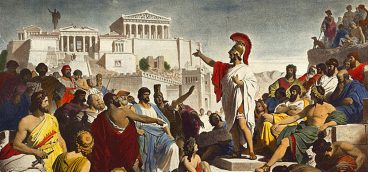Despotism of the Wise

For readers who missed part 1 of this series of posts, I am summarizing a fictional novel written almost forty years ago.
Meanwhile, back in Washington, D.C… President Johnson had been seized on a Sunday morning, and everyone else on the list had been detained by 8:15 a.m. on Monday. By Monday afternoon, rumors had begun to circulate in Washington that something was amiss, given that Johnson hadn’t returned to Washington as scheduled. But the coup leaders anticipated this and had put out various, often mutually inconsistent, rumors.
The main rumor was the one General Green had given to the Secret Service agents at the LBJ ranch and the Texas Rangers at the roadblock: There was a plot to assassinate the President, probably backed by the Chinese. It was this excuse that allowed Gen. Green and his Marines to take control of the White House.
But by late in the day on Tuesday, it was obvious that somebody needed to speak to the American people, and George Leader scheduled a televised address for Wednesday at 11:00 a.m. Eastern time. Just about everyone in America within 50 miles of a TV or radio had stopped what they were doing to watch or listen.
Sitting not behind the President’s desk, but at a smaller desk that had been brought into the Oval Office, George Leader began his address as follows:
“Good morning, fellow Americans. For those of you who don’t know me, I am Senator George Leader of Massachusetts. To my right is my wife, Jenny Leader, and to my left is General William Green, Jr., Commandant of the United States Marine Corps. For reasons that will soon become clear, I am serving as Interim President of the country until various urgent matters can be cleared up.
“I am sure you will be happy to know that President Johnson is safe and healthy, as are members of his Cabinet and advisory team. I am sorry to inform you, however, that they are currently under arrest.”
One gigantic gasp went up across the country as George Leader spoke these words, but he quickly pivoted to the Black Hole plot. George used slides showing the actual documents Gen. Green had stumbled on, walking his rapt audience of nearly 200 million people through the plot.
The main points George dwelt on were these: President Johnson and his co-plotters were planning to take the world to the brink of nuclear Armageddon; they were doing so secretly, without informing the American public; and they were prepared to sacrifice either Israel or West Germany to achieve their ends.
By noon Washington time the country was in an uproar, but it was also paralyzed. The fact that a successful coup had occurred was simply unbelievable. On the other hand, if the coup hadn’t occurred, the world might even now be entering nuclear winter.
While the paralysis continued, George Leader and his team moved forward with their plans to change the way the American government worked. The Georgetown Convention had, before Project Black Hole was uncovered, been far advanced in its plans to revise the U.S. Constitution.
Interim President Leader’s plan was to impose a new Constitution on the country temporarily, until he stepped down. That way he and his advisors could observe how the new Constitutional provisions worked and how well accepted they were by the American public.
That afternoon George said, “Jenny, we need to get Grace Atkinson down here. I want to go through the new Constitution line-by-line with the whole team. Could you give her a call?”
Jenny called Grace’s apartment in Hyde Park many times but got no answer. The next day a package arrived at the White House from Grace, addressed to George and Jenny. The cover letter began like this: “If you are reading this letter, I have already died.”
“No!” cried Jenny. But it was true.
The letter went on to explain that Grace had significantly revised her opinions about how the American government should work, and she had enclosed a marked-up version of the Constitution, eliminating voting in favor of selecting government officials by lot.
Not only that, but Grace advocated selecting leaders not from among the general adult population, but only from among what she called “America’s most capable citizens.”
Needless to say, George and Jenny Leader were deeply baffled by this turn of events. Grace’s letter contained an apology for the fact that she hadn’t had an opportunity to discuss her suggestions with the them. Unfortunately, her disease had progressed rapidly.
Grace’s letter began with a quote from Schopenhauer: “If you want to achieve utopian plans… the only solution to the problem is the despotism of the wise.” And the letter ended with a plea: Before dismissing her ideas out of hand, would they please take a meeting with her friend, Dr. Michael Solomon?
Jenny stared at the letter and then at her husband. “This is crazy, George,” she said. “What’s obviously happened is that Grace’s disease affected her mind at the end.”
George nodded. “You’re probably right, Jenny,” he said. “But Grace has been so important to this effort, has made so many crucial contributions, I’m thinking maybe we should talk with this Solomon fellow if only out of a last gesture of gratitude to her.”
“Look, George,” Jenny replied, “nobody had more respect for Grace than me, but we’ve got a country to run. We can’t be meeting with every two-bit professor who has some crackpot idea.”
George and Jenny were walking down the hall away from the Oval Office, arguing spiritedly about Grace’s last request. Not paying attention to where they were going, they nearly bumped head-on into Senator George Aiken of Vermont.
“What’s all the ruckus?” Aiken asked.
George and Jenny briefly explained Grace’s idea about selecting officials by lot, and Grace’s further idea that only people with high IQs should be considered. To their astonishment, Aiken said, “Sounds like one of the more sensible ideas I’ve heard in this town.”
A call went out to Dr. Michael Solomon.








